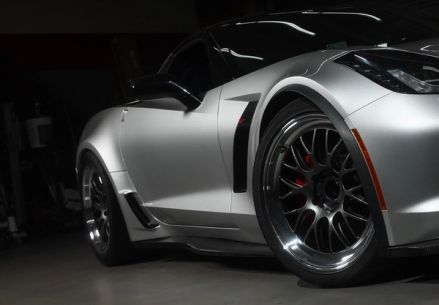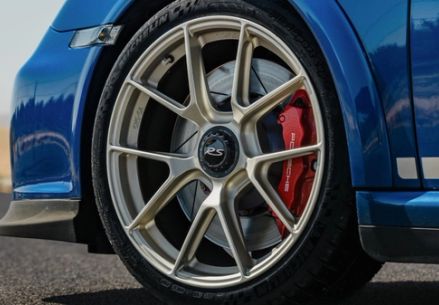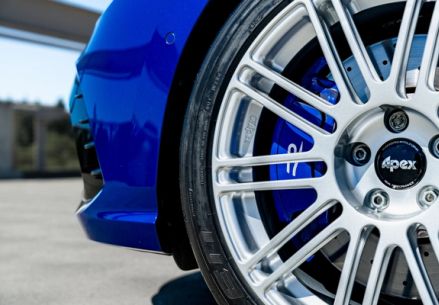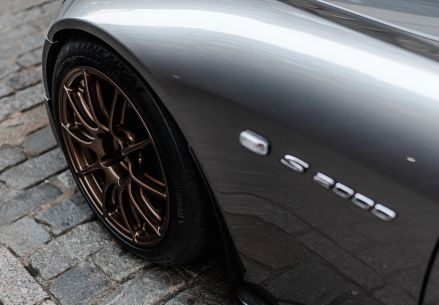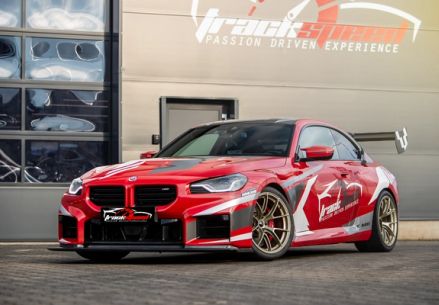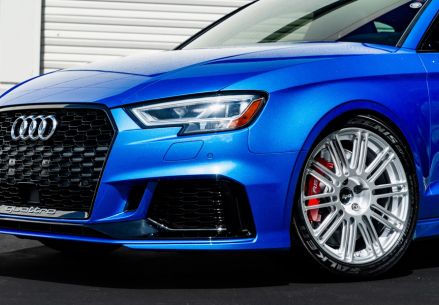
"Forged" Doesn't mean "Strong"
Article | 08/14/2019 by Brandon Kimbell
Updated on 11/26/2025
We committed to a meaningful step up in strength when we designed our forged wheels, so we increased load ratings significantly. Our 18” and 19” BMW wheels went up by 250 pounds per wheel. That’s 1,000 pounds more capacity per car to better handle cornering abuse from sticky tires, downforce, and heavier cars.
Why does this matter? Because it’s a measurable increase, not just hype.
Misleading use of the word
Just because a wheel is forged doesn’t guarantee that it’s stronger than a cast or flow-formed wheel. Forging is a manufacturing process, not a measure of strength.
Unfortunately, the word “forged” has long been used in marketing as a synonym for “strong.” This common misconception has helped sell a lot of questionable wheels, as consumers are now trained to infer this connection on their own. That connection needs to be broken. Strength should be evaluated on its own, apart from the manufacturing process.
We’re clearing this up, as the benefits of our new forged line of wheels really stand out once you take away the hype and do an apples-to-apples comparison.
The confusion starts with how manufacturing processes are compared in most marketing. In a typical comparison, cast wheels are described as porous and weak, whereas forged wheels are described as denser and stronger. This is absolutely true, and we don’t dispute it … if you’re comparing the same exact shape and same amount of material.
What’s less obvious is that most forged wheel manufacturers have no intention of selling you a wheel that is 100% identical in shape to a cast wheel. The goal of most forged wheel manufacturers—us included—is to sell you a forged wheel that uses less material and is, therefore, lighter than a cast or flow-formed wheel.
The question becomes, How much material is getting removed, and when does it stop? The final design determines whether strength goes up, down, or stays the same.
Clearly stronger
We’ve pitted our flow-formed wheels against forged wheels for over a decade now, and we are well aware of the confusion surrounding the term “forged”. We don’t want to capitalize on that, so we committed to increasing our load rating first to ensure our wheels were measurably stronger on paper. Only then did, we turn our focus to weight-optimization at that higher load rating. The result is wheels that are much stronger than their flow formed counterparts.
We could’ve made our forged wheels even lighter than we did, which would have been cool, but most of our customers have been asking for something more robust. Our goal was a balance instead of optimizing to either extreme.
Will we ever make an even stronger wheel? You bet your ass we will! How about an even lighter forged wheel? Definitely!
Not everyone has the same strength and weight needs, so we’re excited to bring load ratings to the forefront of discussion and to continually expand the solutions we offer.
Tags
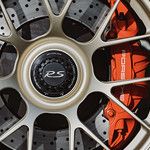 Brandon Kimbell
Brandon KimbellBrandon is a Porsche Fitment Expert at APEX Wheels. Prior to joining APEX in 2022, he worked as Office Manager for a Porsche & Ferrari service and race shop, guiding customers in all areas – suspension, power, aesthetics, you-name-it. His first foray into racing came In college when he was asked to assist at a PCA club race. Says Brandon, “I figured if I am already making the drive, I might as well enter the HPDE happening at the same time.” He hasn't stopped since. Among the various cars he has owned and/or tracked are a ‘74 Corvette Convertible, ’74 Firebird Formula 400, ‘17 GTI, ‘07 Cayman S, and his current ride, a ‘12 Cayman R (BGB X51 pack 3.8L) with staggered APEX EC-7RS 18x9”ET46 & 18x10” ET36 in Motorsport Gold. Fun Fact: Brandon is a big fan of SIM racing, which he uses to learn about a new track he’s going to or get a refresher on a familiar track, as well as improve his racecraft.Have questions about wheels for your Porsche? Use our contact form and ask for Brandon.
If you like cheap gear you will hate this newsletter.
